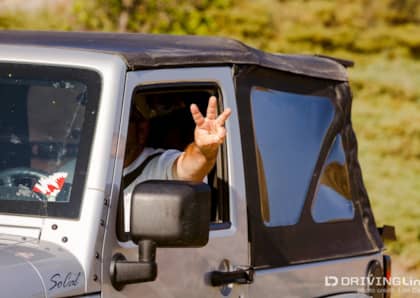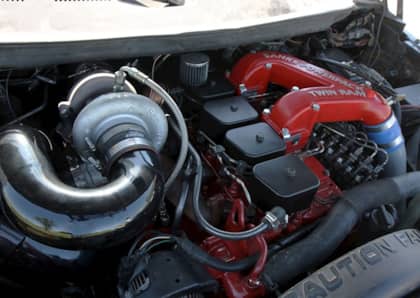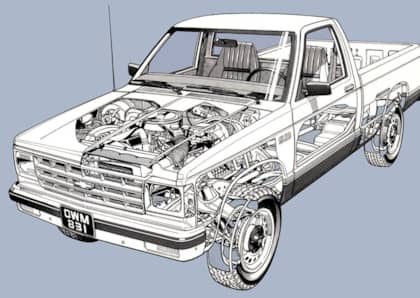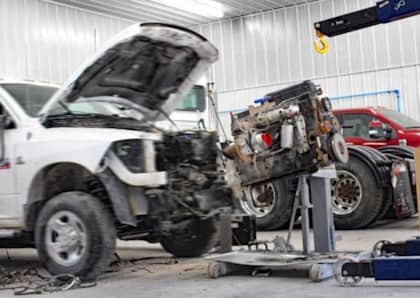Coyote Canyon: My First California Jeep Run
I’ll never forget all of the fun and the lessons learned on my very first trail run in California. I had just picked up my 2007 Jeep Wrangler from the shop the night before, where it got a lift, new tires and 5:13 gears. It felt huge, and I was still getting used to driving it. The lift was supposed to be 3 inches, but heavy-duty springs brought the total lift height to 5.5 inches (which I later lowered). My Jeep felt so big, and I felt so small.

The California desert was new terrain to this East Coast girl, and I eagerly joined a “Newbie Run” to South Coyote Canyon in Anza-Borrego Desert State Park to learn more about off-roading in the harsh and remote environment. The first year of the JK Wrangler model was 2007; most of us had just started our builds, and we couldn’t wait to test them out and see how the JKs handled the trail.

Newbie Runs are often hosted by Jeep clubs to teach basic off-roading skills to new Jeep owners. The pace is usually slower than a regular run because experienced off-roaders spend a lot of time coaching people through the obstacles.
Airing Down and Disconnecting
The first skill taught was airing down tires and disconnecting sway bars.

Airing down tires provides a softer ride and better traction in deep sand and on the rocks. On a solid-axle vehicle like the Wrangler, disconnecting the sway bar allows for more suspension articulation, or flex. Articulation is what allows both tires to maintain contact with the ground on uneven surfaces like large boulders, which is key to maintaining traction. After a drivers meeting in which we went over some rules and trail etiquette, we hit the trail. Experienced drivers were interspersed between new off-roaders.
Deep Sand and Water Crossings
The trail started off on deep sand as it passed some historical sites. Everyone had a chance to practice their deep sand driving skills before reaching the water crossings.

Back then, the second water crossing required driving in the stream bed for 100 yards before exiting on the other side. The water was 3 feet deep, and trees along the banks created a canopy overhead that made it feel as if we were driving through a tunnel. We learned how to create a steady bow wave to keep the water away from our engines. That amazing stream crossing has since been rerouted when it was decided that vehicles were causing too much damage; these days it’s a simple, straight-across crossing.
Rock Crawling on Boulder Alley
The best fun came with the long climb through a rock garden up a mountain.

This section of trail is often called “Boulder Alley" — rated a 6/10 back then.

Participants learned about tire placement and how to choose a line. We learned to overcome our natural tendency to avoid big rocks, and instead place our tires on the big rocks so we wouldn’t high center.

It was a good way to see what further modifications a person might want to make to their Jeep, like trimming or changing out the stock fenders so the tire has more room to flex. Halfway up the climb I heard a ticking noise and discovered that I had torn the boot on my front drive shaft. I learned that lifting a 2DR JK more than 3 inches meant needing to upgrade the front drive shaft to correct the geometry.

After a while we got into the rhythm of climbing over the big rocks. Near the top we each took a turn for the obligatory poser shot on the big rock.

More Sand
The trail was again sand as it descended into Collins Valley. A few people had some high speed fun as we raced to the camp in Sheep Canyon.

Camping used to be free at this primitive campsite. There was a ramada, fire ring and pit toilet.

There was plenty of room for everyone to spread out, and we tucked our tents into the canyon.

After dark we hooked a movie projector up to a Jeep battery, hung a sheet on the ramada and watched trail videos while we ate dinner.

Always Be Prepared
After a leisurely breakfast the following the morning, we packed up camp and started retracing our steps back to pavement.
Somehow, one of the drivers managed to snap an axle. A major problem on a relatively easy run reinforced the need to always be prepared for emergencies, carrying the right tools and the safety of traveling with other people. A few of the guys managed to secure the axle with ratchet straps well enough to tow it closer to pavement.
We strung a tarp between Jeeps to provide shade and relief from the desert sun. There was no cell phone service out here, so while some people worked on the broken Jeep, another group headed back to town to contact a tow company.

We learned the importance of having AAA Premiere if you spend a lot of time in remote locations far from home. The free 200-mile tow you get each year can save you a lot of money if you break down.

The breakdown left us out in the desert many hours longer than we had planned, but we still had fun (except for the guy with the broken axle).

And that was the beginning of my obsession; I was hooked on desert off-roading. I started going on every local Jeep run I could find.
Just a Shadow of Its Former Self
We joined the Newbie Run to Coyote Canyon again the following year, and this time I was the Trail Boss leading a group of experienced drivers ahead of the others to prepare the campsite for their arrival. When we reached Boulder Alley we were disappointed to find that most of the larger boulders had been removed, including the pointy one near the top that would dent the side of your Jeep if you chose the wrong line. The rumor was that “trail maintenance” for a Jeep Jamboree was responsible. It only took us an eventful 20 minutes to get to the camp.

Ten years later, the things that made the trail so much fun are now just a memory. The water crossing has been moved, Boulder Alley has been tamed, and the primitive campsite has been upgraded and now charges a fee. It’s still an enjoyable trail run and a beautiful place to camp and explore, but I’m glad we got to experience it while it was still wild.
If you're just get started in the off-road world, nothing can beat going out on the trail with a group of friendly and experienced people.











